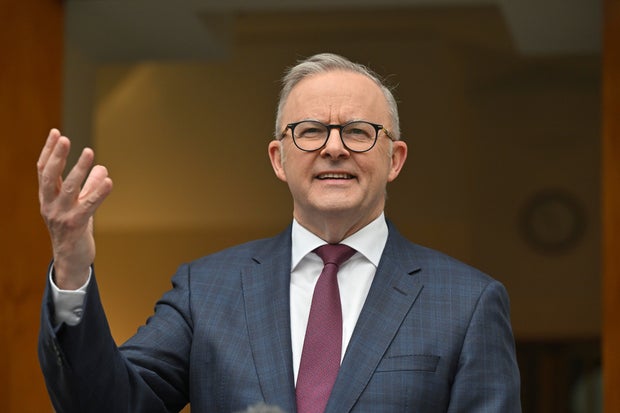[ad_1]
The decrease home of Australia’s parliament handed laws Wednesday that, if permitted as anticipated, will ban youngsters beneath the age of 16 from utilizing most social media platforms, bringing the nation ever nearer to implementing what can be a uniquely strict regulation governing children web habits.
The nation’s Home of Representatives passed the bill by a sweeping margin, with 102 votes in favor and solely 13 in opposition to the laws. It should now transfer to the Senate the place it’s anticipated to move in the course of the parliament’s ultimate session of the 12 months on Thursday.
Australia’s main events within the Home all supported the invoice, which might see social media firms comparable to TikTok, Fb, Snapchat, Reddit, X and Instagram face fines of as much as 50 million Australian {dollars} ($33 million) for failing to stop individuals beneath 16 from creating accounts on their platforms.
Tech large Meta, which owns Fb, Instagram and Threads, has referred to as for the invoice to be delayed.
In a statement posted on-line Tuesday, Meta stated it was “involved the federal government is speeding this laws with out ample session or proof and there are nonetheless many unknowns with respect to its implementation.”
“The Authorities’s method will possible require every app supplier to gather private identification or biometric knowledge from all Australians with the intention to stop beneath 16s from accessing their providers, an inefficient and burdensome course of for everybody,” a Meta spokesperson stated.
Meta additionally pointed to a coverage it launched earlier this 12 months on its Instagram platform, Instagram teen accounts, which limits who can contact youngsters through their accounts and makes an attempt to reasonable the content material that younger customers see.
In a submit shared final week on the X platform that he owns, tech billionaire Elon Musk additionally condemned the Australian invoice and stated it appeared to him “like a backdoor method to management entry to the Web by all Australians.”
Mick Tsikas/AAP Picture through AP
Different impartial our bodies and non-profit organizations have additionally taken intention on the invoice, voicing concern that younger individuals’s human rights could possibly be restricted by it.
The CEO of the Save the Kids charity Mat Tinkler stated in a statement earlier this month that whereas he welcomes authorities efforts to guard youngsters from hurt on-line, the answer ought to be regulating social media firms, reasonably than introducing a blanket ban.
“We’re asking the federal government to rethink this legislative method and as a substitute use the momentum of this second to carry the social media giants to account, to demand that they embed security into their platforms reasonably than including it as an afterthought, and to work carefully with consultants and youngsters and younger individuals themselves to make on-line areas safer, versus off-limits,” Tinkler stated.
The Australian Human Rights Commission, an impartial authorities physique, expressed its personal “critical reservations” over the proposed regulation in an evaluation printed final week.
“There are much less restrictive options obtainable that might obtain the intention of defending youngsters and younger individuals from on-line harms, however with out having such a major unfavorable influence on different human rights. One instance of an alternate response can be to position a authorized obligation of care on social media firms,” the evaluation stated. “We additionally want to assist youngsters and younger individuals to higher navigate on-line areas by making certain the nationwide curriculum features a particular give attention to educating digital literacy and on-line security.”
Australian Prime Minister Anthony Albanese rejected criticism of the proposed regulation as he addressed the parliament Monday.
“There are frequent sense exemptions. We wish to make it possible for younger individuals can proceed to entry well being and schooling associated providers — Headspace, YouTube, Google Classroom — in addition to messaging providers and on-line video games,” he stated.
The Australian chief added that there can be “very robust and strict privateness necessities to guard individuals’s private info, together with an obligation to destroy info offered as soon as age has been verified.”
Regardless of the criticism, the laws stays well-liked amongst Australians, in response to latest polling knowledge.
A YouGov survey launched Tuesday confirmed 77% of Australians again the ban on under-16s, and 87% of stated they supported the introduction of stronger penalties for social media firms that fail to adjust to laws.
[ad_2]
Source link

